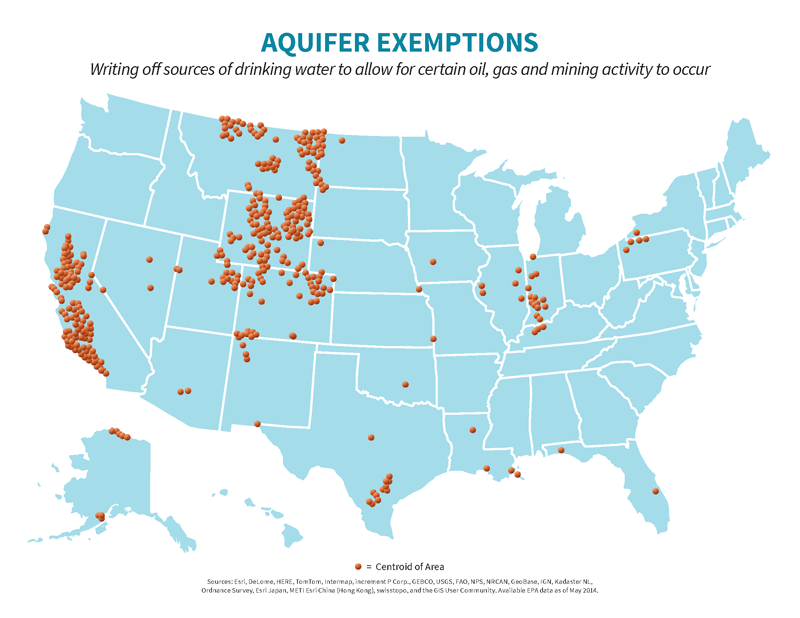
The Aquifer Exemption program in the Safe Drinking Water Act (SDWA) Underground Injection Control (UIC) program allows certain oil and gas and mining activity to occur in groundwater that would otherwise be protected as a drinking water source.
The Aquifer Exemption program allows injection directly into once protected aquifers and essentially “writes off” potential groundwater sources.
The UIC program is supposed to protect underground sources of drinking water from injection wells, whether for the disposal of oil and gas waste, or the injection of fluids for enhanced recovery (ER). Yet Aquifer Exemptions provide a way around these protections and hands over groundwater to the oil and gas industry, essentially “writing off” potential drinking water sources.
The rules for exempting aquifers are more than 30 years old, and do not reflect current and future water shortages, population shifts and ever-changing water treatment and well drilling technologies. Residents of many oil and gas producing states rely heavily on groundwater and have increasingly had to turn to lower quality and deeper aquifers. The outdated exemption criteria may be exposing vital sources of groundwater to pollution.
Oversight of the Aquifer Exemption program has been lacking at both the state and federal levels. EPA and state agencies have fallen short in basic regulatory duties, such as record-keeping, mapping and enforcing the boundaries of exemptions.
In California, a massive failure resulted in thousands of wells receiving permits to inject into non-exempt aquifers. We are working in California to reform the UIC program there and shut down illegal injection wells.
At the Federal level, more oversight is needed. Clean Water Action is calling on EPA to undertake a number of actions:
- Impose an immediate moratorium on granting any new exemptions until new rules are in place
- Update the regulatory exemption criteria and required analysis to reflect changing circumstances and be more protective of potential drinking water sources, including full and transparent opportunities for public notice and ability to comment on each aquifer exemption application.
- New criteria should not allow aquifers be exempted solely on the basis that they are mineral, hydrocarbon or geothermal energy producing.
- Disclose a full inventory in database and spatial format of all current and past aquifer exemption decisions. Conduct an investigation into whether injection is occurring into nonexempt aquifers and where exemptions have been granted but not utilized
- Investigate whether a streamlined approval process for states to implement UIC programs related to oil and gas activity has played a role in the Aquifer Exemption program oversight and management problems.
The UIC program is included in the nation’s landmark drinking water law because its purpose is to protect underground sources of drinking water. EPA and state agencies must improve oversight and enforcement of aquifer exemptions. Long term reforms are needed in order to safeguard our drinking water future from oil and gas.
Learn More
- Aquifer Exemption Fact Sheet - March 2016
- Aquifer Exemption Petition - March 2016
- Aquifer Exemptions: A first ever look at the regulatory program that writes off drinking water resources - Full Report - Jauuary 2015